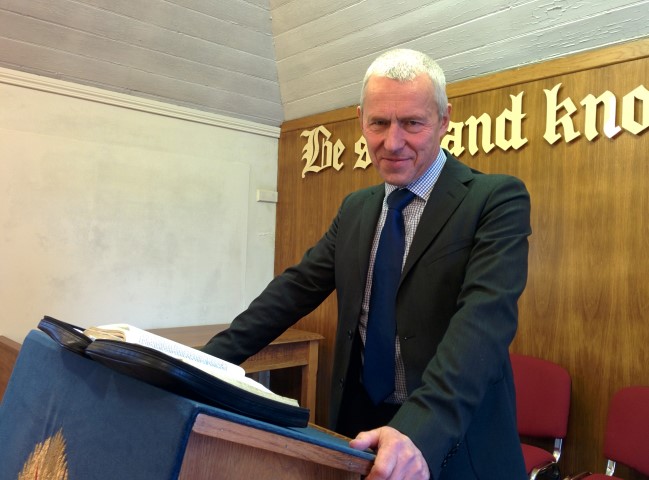Date: Sun PM 25th June 2023
Preacher: Rev. David McLaughlin
Bible Reference: Ezekiel 16:49-50
Behold, this was the iniquity of thy sister Sodom, pride, fulness of bread, and abundance of idleness was in her and in her daughters, neither did she strengthen the hand of the poor and needy. And they were haughty, and committed abomination before me: therefore I took them away as I saw good.
Summary of the Sermon on Ezekiel 16:44-54
1. Scriptural Foundation and Context
- Text: Ezekiel 16:44-54, with emphasis on verses 49-50, which outline the sins of Sodom: pride, fullness of bread (prosperity), abundance of idleness, neglect of the poor and needy, haughtiness, and committing abominations. The passage concludes with God’s judgement: “Therefore, I took them away as I saw good.”
- Context in Ezekiel: The chapter compares Jerusalem to Sodom and Samaria, portraying them as sisters who have fallen into sin. Jerusalem is depicted as worse than Sodom due to its greater corruption.
- Purpose: The preacher uses this text to critique Pride Month, arguing that it celebrates sins akin to those of Sodom, particularly pride and sexual immorality, which are condemned in Scripture.
2. Emergence of Pride Month
- Historical Background:
- Pride Month originated in the United States to commemorate the Stonewall Riots of 1969, a pivotal event in the LGBTQ+ rights movement.
- The first Pride March in the UK was held in London on 1 July 1972, deliberately timed close to the Stonewall anniversary.
- Pride events have since expanded across major UK cities (e.g., Cardiff, Edinburgh, Glasgow, Manchester, Liverpool, Belfast) and throughout the Western world.
- Cultural Significance:
- Pride Month is described as a month-long celebration, commemoration, and commendation of the LGBTQ+ community, focusing on their fight for equality.
- The preacher contrasts this with single-day observances like Father’s Day, Mother’s Day, or Remembrance Day, emphasising the unprecedented scope of dedicating an entire month to this cause.
3. Endorsement of Pride Month
- Political and Cultural Support:
- The sermon cites former US President Barack Obama’s 2016 proclamation declaring June as “Lesbian, Gay, Bisexual, Transgender Pride Month,” calling for the elimination of prejudice and celebrating diversity. The preacher views this as a significant endorsement from a high-profile leader.
- Other world leaders, including church leaders (evangelical, fundamentalist, and liberal), are said to have supported Pride Month, indicating widespread societal acceptance.
- Biblical Critique:
- The preacher references Isaiah 5:20-21, which condemns those who call evil good and good evil, to argue that such endorsements invert moral truths.
- The sermon notes a 2023 New York Pride event where participants chanted, “We’re here, we’re queer, we’re coming for your children,” interpreting this as evidence of a broader agenda, including lowering the age of consent or decriminalising paedophilia, which the preacher finds alarming.
4. Essence of Pride Month
- Biblical Perspective:
- The preacher argues that Pride Month is fundamentally a “celebration of sin,” particularly the sins listed in Ezekiel 16:49-50:
- Pride: Described as the “fountainhead” of Pride Month, pride is condemned as a deadly sin in Proverbs 6:16-17 (a “proud look” is an abomination to God) and Proverbs 16:18 (“Pride goeth before destruction”). The preacher connects pride to Lucifer’s fall (Isaiah 14:12-14) and warns that it destroys nations and souls.
- Fullness of Bread (Prosperity): Prosperity is seen as fostering independence from God, leading people to live as if they are not accountable to Him.
- Abundance of Idleness: The preacher laments a cultural shift towards idleness (e.g., calls for a four-day workweek), suggesting it provides time for sinful pursuits, as “the devil finds work for idle hands.”
- Abominations: The sermon equates “abominations” with sexual sins, including homosexuality, fornication, and adultery, citing Romans 1:18-32 and 1 Corinthians 6:9-11, which list behaviours that exclude people from God’s kingdom unless they repent.
- The preacher argues that Pride Month is fundamentally a “celebration of sin,” particularly the sins listed in Ezekiel 16:49-50:
- Theological Stance:
- Pride Month is seen as an affront to God because it celebrates behaviours explicitly condemned in Scripture.
- The preacher argues that aligning Pride Month with Christianity, or invoking Jesus Christ in its support, is blasphemous, as Christ “hated iniquity and loved righteousness” (Hebrews 1:9).
5. Societal Implications
- Cultural Shifts:
- The sermon highlights societal changes, such as transgender toilet policies, gender-neutral naming, and the introduction of Relationship and Sexuality Education (RSE) in Northern Ireland schools. RSE includes topics like abortion and is seen as bypassing parental consent and local education authority autonomy.
- Corporations and institutions are accused of promoting the LGBTQ+ agenda, including through children’s books, pride flags, and corporate policies.
- Moral Concerns:
- The preacher views these developments as a form of “brainwashing” and “sexualisation” of children, citing examples like a Norwegian church displaying a pride flag alongside a portrait of Christ.
- The sermon argues that the LGBTQ+ community, despite claiming marginalisation, exerts significant influence, as evidenced by an entire month dedicated to their cause compared to single days for other groups.
6. God’s Judgement and Mercy
- Divine Judgement:
- The preacher asserts that Pride Month, as a celebration of sin, is under God’s judgement, drawing parallels to Sodom’s destruction (Ezekiel 16:50).
- Romans 1:18-32 is cited to show God’s wrath against those who suppress truth and engage in “vile affections,” including homosexuality.
- The sermon emphasises that sin, including homosexuality, leads to spiritual and eternal death (Romans 5:12, 6:23), but God’s judgement is just because He is holy.
- God’s Mercy:
- Despite His judgement, God offers salvation through repentance and faith in Jesus Christ. The preacher cites John 3:16 and 1 Corinthians 6:11, which notes that some Corinthians were once engaged in sinful lifestyles but were “washed, sanctified, justified” through Christ.
- The sermon references Lot’s deliverance from Sodom as an example of God’s mercy even to backsliders, emphasising that salvation is available to all who repent, including those involved in the sins associated with Pride Month.
7. Christian Response to Pride Month
- Call to Action:
- Christians are urged to warn about sin and its consequences, preach the gospel, and call for repentance. The preacher views this as an act of love, not hate, citing the need to “flee from the wrath to come” (Matthew 3:7).
- The church must not celebrate or condone sin but proclaim God’s mercy and the transformative power of the gospel.
- Practical Application:
- Pastors, parents, teachers, and Christians in the workplace are encouraged to uphold biblical truth, warn against sin, and share the hope of salvation through Christ.
- The sermon emphasises the importance of a biblical worldview that rebukes cultural sins while offering the good news of forgiveness and redemption.
8. Conclusion
- The preacher concludes by calling for genuine repentance and faith in Christ, emphasising that “whosoever shall call upon the name of the Lord shall be saved” (Romans 10:13).
- Pride Month is presented as a modern manifestation of the sins of Sodom, rooted in pride, prosperity, idleness, and immorality, and thus under God’s judgement.
- However, the sermon balances this warning with the hope of salvation, encouraging listeners to turn from sin and embrace Christ’s mercy.
Tone and Style
- The sermon is delivered with conviction and urgency, reflecting the preacher’s burden to address a culturally sensitive topic from a biblical perspective.
- The tone is firm and confrontational regarding sin but compassionate in offering the gospel as a solution. The preacher anticipates accusations of hate speech but defends the message as rooted in love and biblical truth.
- The use of Scripture is central, with frequent references to Ezekiel, Romans, Proverbs, and other passages to ground the critique of Pride Month in biblical authority.
Key Themes
- Sin and Judgement: Pride Month is seen as a celebration of sins condemned in Scripture, particularly pride and sexual immorality, which provoke God’s judgement.
- Biblical Worldview: The sermon advocates for a worldview rooted in Scripture, rejecting cultural acceptance of behaviours that contradict God’s standards.
- God’s Mercy and Salvation: Despite the condemnation of sin, the sermon emphasises God’s love and provision of salvation through Christ for all who repent.
- Christian Responsibility: Believers are called to warn against sin, preach the gospel, and uphold biblical truth in a culture that celebrates what God condemns.
Subscribe to the podcast here:
Spotify Podcasts | Apple Podcasts | Pocket Casts
Email | RSS | more information here





